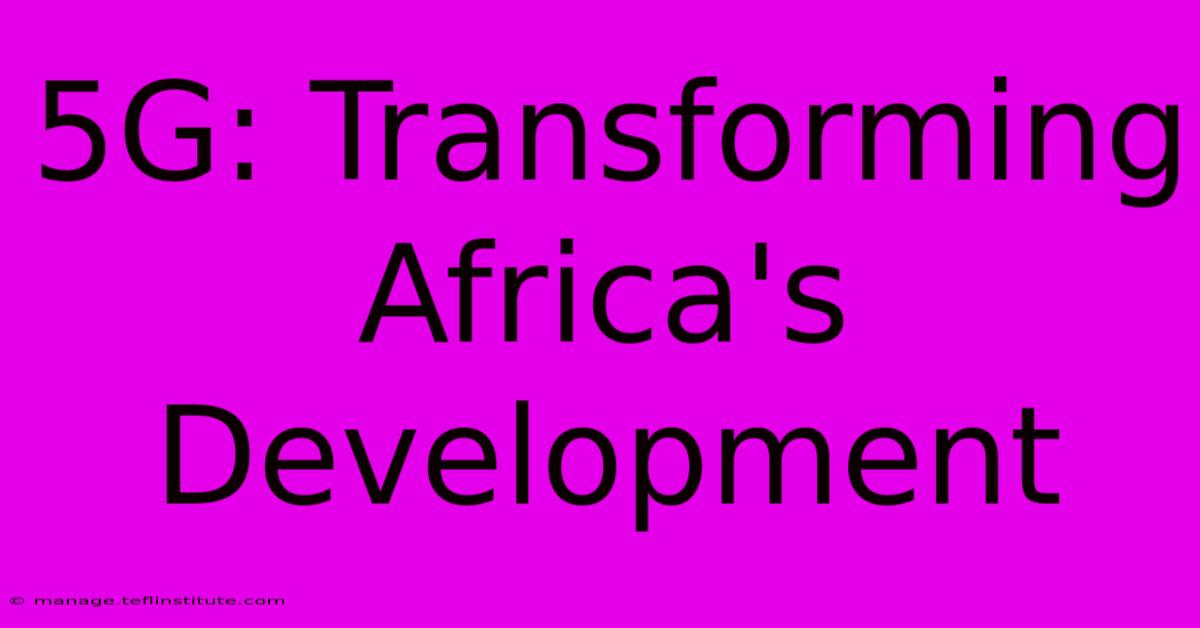5G: Transforming Africa's Development

Table of Contents
5G: Transforming Africa's Development
The arrival of 5G technology in Africa presents an unprecedented opportunity to accelerate development across the continent. Beyond faster internet speeds, 5G promises to revolutionize sectors like healthcare, education, agriculture, and manufacturing, enabling solutions that were previously unimaginable.
Unleashing the Potential of Connectivity:
5G's ultra-low latency and high bandwidth capabilities are crucial for unlocking the full potential of digital transformation. With 5G, Africa can:
- Bridging the Digital Divide: High-speed connectivity will empower remote communities, providing access to education, healthcare, and online services, fostering greater social inclusion.
- Boosting Economic Growth: 5G will fuel innovation in key industries, attracting investments and creating jobs. Smart factories, precision agriculture, and telemedicine will become viable realities, leading to increased productivity and economic competitiveness.
- Empowering Entrepreneurship: 5G will enable the rise of new business models, including e-commerce, digital marketplaces, and fintech solutions, creating opportunities for entrepreneurs and startups.
- Improving Healthcare Access: Remote surgery, telemedicine, and real-time patient monitoring become possible, enhancing healthcare access in underserved areas and improving medical outcomes.
Challenges and Opportunities:
While the potential of 5G is immense, there are significant challenges to overcome for its successful adoption:
- Infrastructure Development: Massive investment in infrastructure is required to build out 5G networks, including fiber optic cables, base stations, and spectrum allocation.
- Digital Skills Gap: Developing a skilled workforce capable of leveraging 5G technologies is crucial to maximizing its impact.
- Regulatory Frameworks: Clear, supportive, and inclusive regulatory frameworks are essential to foster a favorable environment for 5G adoption.
- Cost Considerations: The initial cost of 5G technology can be a barrier for some individuals and businesses, requiring innovative financing models and government support.
A Collaborative Effort:
Overcoming these challenges requires a collaborative effort involving governments, telecommunications companies, technology providers, and development partners. This includes:
- Prioritizing infrastructure investment: Governments should prioritize public-private partnerships to accelerate infrastructure development.
- Investing in digital skills training: Education and training programs are crucial for building a digitally literate workforce.
- Creating conducive policy environments: Governments should develop comprehensive digital strategies and policies that promote innovation and investment.
- Facilitating affordable access: Policies and initiatives should ensure affordability and access to 5G for all, bridging the digital divide.
Conclusion:
5G represents a transformative opportunity for Africa, offering the potential to leapfrog traditional development paths and accelerate progress towards a more inclusive and prosperous future. By tackling challenges and fostering collaboration, Africa can harness the power of 5G to unlock its true potential and build a brighter future for its citizens.

Thank you for visiting our website wich cover about 5G: Transforming Africa's Development . We hope the information provided has been useful to you. Feel free to contact us if you have any questions or need further assistance. See you next time and dont miss to bookmark.
Featured Posts
-
Timothy West A Career In Images
Nov 14, 2024
-
Ex Chelsea Stars Triumph Nostalgia Overload
Nov 14, 2024
-
Free Winter Lights Festival Back At Canary Wharf
Nov 14, 2024
-
Trump Nominates Ex Congresswoman
Nov 14, 2024
Latest Posts
-
Live Updates England Vs Greece Nations League
Nov 15, 2024
-
England Vs Greece Nations League Live Updates
Nov 15, 2024
-
Greece Vs England Live Updates Nations League
Nov 15, 2024
-
Nations League Greece Vs England Live Score
Nov 15, 2024
-
England Wins Greece Game Reaction
Nov 15, 2024
-
Greece Vs England Final Score
Nov 15, 2024
